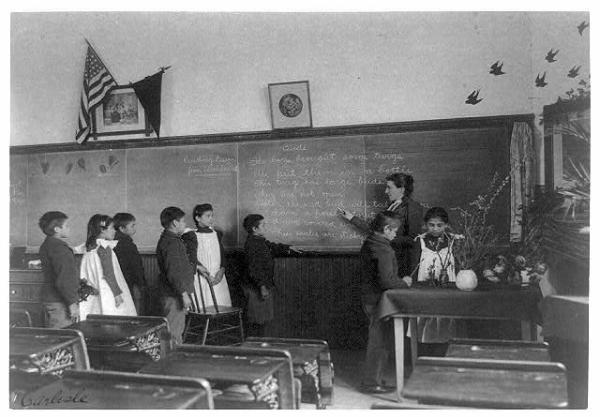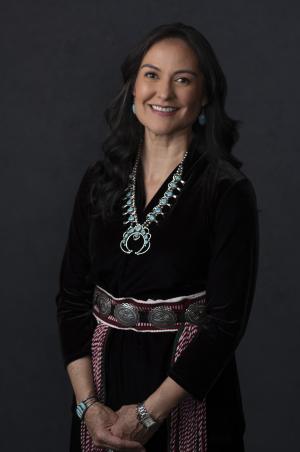Statement from NEH Chair Lowe on President Biden’s Historic Apology for U.S. Federal Indian Boarding School System

Native students at the United States Indian School, Carlisle, Pennsylvania, in 1901
Library of Congress

Native students at the United States Indian School, Carlisle, Pennsylvania, in 1901
Library of Congress
This morning President Biden issued a formal apology for the United States’ 150-year-long system of federal Indian boarding schools, which forcibly separated Native children from their families with the purpose of severing their ties to their communities and cultural practices.
At Gila Crossing Community School in Arizona’s Gila River Indian Community, President Biden delivered his historic acknowledgment of the role of the U.S. government in the forced assimilation of Native Americans as part of his first official visit to an Indigenous community as president.
“I formally apologize, as president of the United States of America, for what we did,” said President Biden. “That’s long overdue.” The President described the federal Indian boarding school system as “one of the most horrific chapters in American history” and one that is not well known to Americans or taught in schools. “I believe it is important that we do know,” he said. “Generations of Native children stolen, taken away to places they didn’t know, with people they’d never met, who spoke a language they had never heard. . . . Their names literally erased, replaced by a number or an English name."
President Biden concluded his remarks by citing the words of anthropologist and Alaskan Native cultural leader Rosita Worl (Tlingit), who earlier this week was awarded a National Humanities Medal at the White House. As a six-year-old, Worl was kidnapped from her family and taken to a boarding school for Alaskan Native children. As an adult, she says that when she hears children singing Tlingit songs, “We will hear the voices of our ancestors, and we are now hearing it through our children.”
“For too long this nation sought to silence the voices of Native children,” said Biden. “But now your voices are being heard.”
President Biden was accompanied at Gila River Indian Community by Secretary of the Interior Deb Haaland, who as head of the Department of the Interior launched the Federal Indian Boarding School Initiative, a comprehensive effort to recognize the troubled legacy of federal Indian boarding school policies with the goal of addressing their intergenerational impact and to shed light on the traumas of the past.
Investigations of the federal Indian boarding school system conducted by the Department of the Interior identified 417 Indian boarding schools with assimilationist policies and practices operating in 37 states (or then-territories) between 1871 and 1969. These schools and similar institutions were supported by $23 billion in FY23 inflation-adjusted dollars from the U.S. government. Federal Indian Boarding School Initiative investigations also confirmed that at least 973 American Indian, Alaska Native, and Native Hawaiian children died while attending federal Indian boarding schools and identified 74 marked and unmarked burial sites at 65 different school sites. They also documented numerous abusive practices that occurred at these schools. Survivors and their descendants described physical, emotional, and sexual abuse at the boarding schools and the trauma of being separated from their families and removed from their homes. Students routinely endured forcible assimilation practices such as haircuts to remove traces of their Native identities and punishments for speaking in their Native languages.
The National Endowment for the Humanities (NEH) is a partner with the Department of the Interior on the Federal Indian Boarding School Initiative, committing $4 million to support the research, analysis, and digitization of records from the boarding schools and the collection of oral histories of former students and their descendants for the creation of a permanent archive. As part of the initiative, the Endowment has also provided special funding to Native organizations for projects documenting and educating others about the history and legacy of federal Indian boarding schools. Additional NEH funding has supported projects such as the Heard Museum’s Away From Home permanent exhibition of American Indian boarding school stories; the Genoa Indian School Digital Reconciliation Project, documenting the experiences of Native American children who attended the Genoa U.S. Indian School in Nebraska; and the National Native American Boarding School Healing Coalition’s National Indian Boarding School Digital Archive.
NEH Chair Shelly C. Lowe (Navajo) joined President Biden and Secretary Haaland at today’s event at the Gila Crossing Community School and issued the following statement:
“This is an important day for our country and for all Native peoples. The forced assimilation policies of the U.S. federal boarding school system shattered families, devastated communities, and robbed Native tribes of their histories, cultures, and languages. I am grateful to President Biden for his recognition of the legacy of trauma these schools have left within Native communities. This is an important milestone for all of us in the path toward healing from this dark chapter of American history.”
National Endowment for the Humanities:Created in 1965 as an independent federal agency, the National Endowment for the Humanities supports research and learning in history, literature, philosophy, and other areas of the humanities by funding selected, peer-reviewed proposals from around the nation. Additional information about the National Endowment for the Humanities and its grant programs is available at www.neh.gov.
